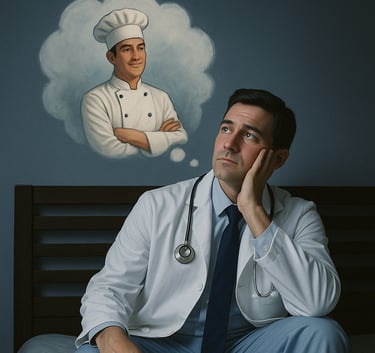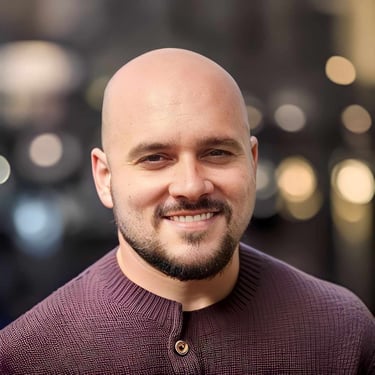What If You Regret Becoming a Doctor?
This article explores the quiet, often unspoken regret some physicians feel about their career path. It offers a compassionate look at how therapy—especially EMDR and depth work—helps doctors process identity conflict, grief, and emotional fatigue without judgment or drastic decisions.
PHYSICIANSEMDR THERAPYMEDICINECAREER REGRET


You worked for this.
Sacrificed for this.
Shaped your identity, your relationships, your future around this.
And now, somewhere deep inside, you’re wondering:
Did I make the wrong choice?
Was it worth it?
What else could my life have been?
It’s a question most doctors don’t say out loud.
But in therapy, behind closed doors, once trust is built—it comes up more than you’d think.
This doesn’t mean you hate medicine.
It doesn’t mean you’re weak or ungrateful.
It means you’re human.
And most of all, it means something in you deserves to be heard.
What If You Regret Becoming a Doctor?
Regret doesn’t always mean you want to leave.
Sometimes it means:
You miss parts of yourself that medicine pushed away
You carry grief for what it cost you—relationships, time, health
You feel trapped, and no one knows
You’ve built success on a foundation that now feels unstable
You don’t know who you’d be if you weren’t a physician
These are real, valid questions.
And most physicians have never had a safe space to explore them without fear of being judged, “diagnosed,” or talked out of it.
Regret Isn’t the Whole Story, But It’s Part of It
Because medicine is supposed to be a calling.
Because you gave up too much to turn back.
Because your identity is fused with your profession.
Because regret threatens the whole structure.
And because if you start to feel it, you don’t know what it would mean.
So instead, you:
Power through
Rationalize it
Blame the system
Fantasize about quitting—but never make a move
Numb out, disconnect, or shut down
That’s not avoidance.
That’s survival.
Why It’s So Hard to Admit Regret in Medicine
EMDR therapy to support nervous system reset and reduce stress overload
Psychodynamic work to explore deeper patterns and heal them
Respect for your intelligence, time, and privacy
I understand the specific challenges that a career in medicine can bring.
Private-pay only — no insurance
$250 per session
30-minute video consultation available at no cost
Virtual sessions available in CO, DC, NC, NY, TX, VA, and WA
About Zachary's Therapy Approach
Details
Dr. R was a well-respected internist, mid-50s, who’d been practicing for almost three decades. He came into therapy not with burnout or crisis, but with a persistent heaviness.
It took weeks before he said what was really on his mind: “Sometimes I think I should have done something else with my life.”
He was terrified that saying it meant he was ungrateful, or worse, betraying the people who looked up to him.
In therapy, we unpacked this slowly. We traced it back to his early years, how medicine had always been the plan, how success became his only compass, how the parts of him that loved art, music, or even leisure were abandoned as impractical.
EMDR Therapy helped him release the emotional grip of specific moments: a mentor’s suicide, a lawsuit, the loss of a patient he blamed himself for. Through parts work, we made room for the version of him that still loved his patients—and the one that longed for something else.
He didn’t quit medicine.
But he stopped hiding from himself.
And that changed everything.
Case Story: The Internist Who Couldn’t Say It Out Loud (Edited For Privacy)
This isn’t about “fixing” your regret.
It’s about exploring it—honestly, safely, and without consequences.
In therapy, you get a space where you don’t have to protect the profession.
Where you don’t have to filter what you say.
Where it’s not about convincing anyone else—or even yourself—that you’re fine.
We use:
Existential and Depth Therapy
To explore your identity, purpose, and the emotional weight of regret—without needing to resolve it right away.EMDR Therapy
To release specific moments—training, mistakes, patient loss, system failure—that left emotional residue you still carry.Parts Work
To acknowledge the internal conflict: the part that still believes, and the part that’s tired of pretending.
This isn’t therapy for people who are broken.
It’s therapy for people who’ve carried something alone for too long.
What Therapy Offers That Nothing Else Does
Before becoming a therapist, I worked as a nurse in the ED, med-surg, psych, and home health. I know medical culture from the inside, and I understand that what physicians hold is different in scope and consequence. I've worked with a number of doctors in my practice. That background means less explaining and more room to actually do the work.
Whether it’s healing from childhood trauma, navigating relationship difficulties, or overcoming professional stress, I’m here to help you find the peace and fulfillment you deserve.


Zack Rothwell, PMHNP
Psychiatric Health Nurse Practitioner
Master of Science - UNC Chapel Hill
Accepting New Clients
You may not leave medicine.
You may not change anything externally.
But many clients report:
A softening of the internal fight
A reconnection to the why they started—even if it’s different now
A new sense of agency about how they work, lead, or live
A release of guilt that’s been stealing energy for years
A return of clarity and peace—even without all the answers
Therapy doesn’t demand a decision.
It gives you the clarity to make one—when you’re ready.
And sometimes, it’s not about fixing regret. It’s about finding a way to make meaning of your story again—without erasing the sacrifices.
What Might Shift
Many physicians who start therapy with regret eventually find themselves exploring deeper layers of identity:
Who am I outside of medicine?
What do I actually enjoy when I’m not “on”?
If I could shape my schedule or career differently, what would that look like?
What relationships, hobbies, or values have I neglected?
These aren’t hypothetical. These are the breadcrumbs that lead many clients to a life that feels more integrated—not just functional.
Some restructure their practice. Some take sabbaticals. Some don’t change a thing externally—but everything internally shifts.
That’s the power of this work.
Beyond Regret: Questions That Lead to Healing
Is it normal to regret becoming a doctor?
Yes. Many physicians feel regret at some point—especially during transitions, burnout, or identity shifts. It doesn’t mean you’re unfit. It means you’re reflecting honestly.
Can therapy help even if I don’t want to leave medicine?
Absolutely. Therapy helps you process regret without needing to act on it. Many clients find renewed connection to their work.
What if I regret my career but don’t know what else I’d do?
You don’t need answers to begin. You just need a space where the question is allowed. Therapy is a great place to explore these thoughts.
Is this depression? Or something else?
Regret can exist without depression, but sometimes they overlap. Therapy can help differentiate and address both.
Will therapy talk me out of regret?
No. Therapy helps you understand what the regret means—and what it’s asking you to pay attention to.
Can I stay in medicine and still heal?
Yes. Many clients do. Therapy isn’t about leaving—it’s about living more freely, wherever you are.
How long does it take to feel better?
That varies. Some clients feel shifts within weeks. Others take longer. What matters is progress that feels grounded, not rushed.
FAQs: Physician Regret and Therapy
This is therapy for physicians who are high-functioning but want space to explore what could be different—a private, trusted place to talk about what they've been through and what they're still carrying.
